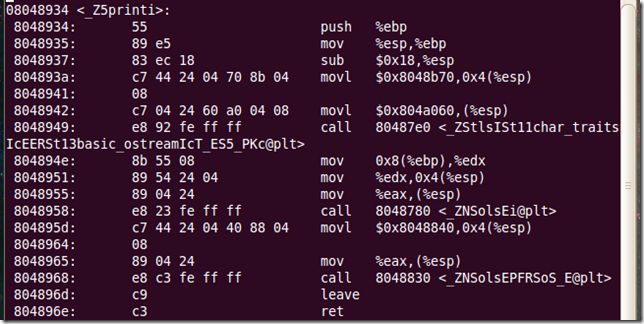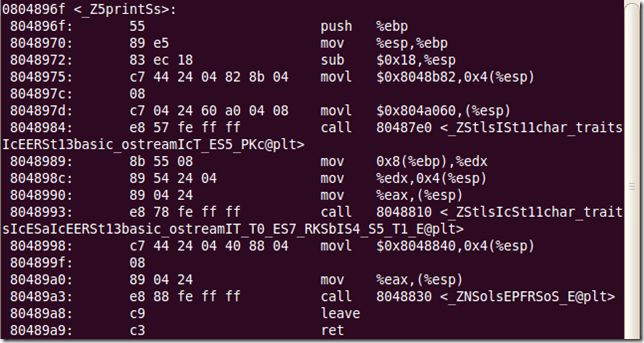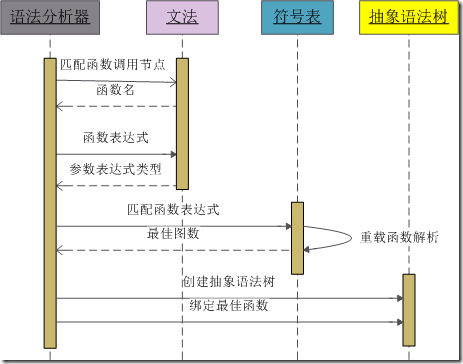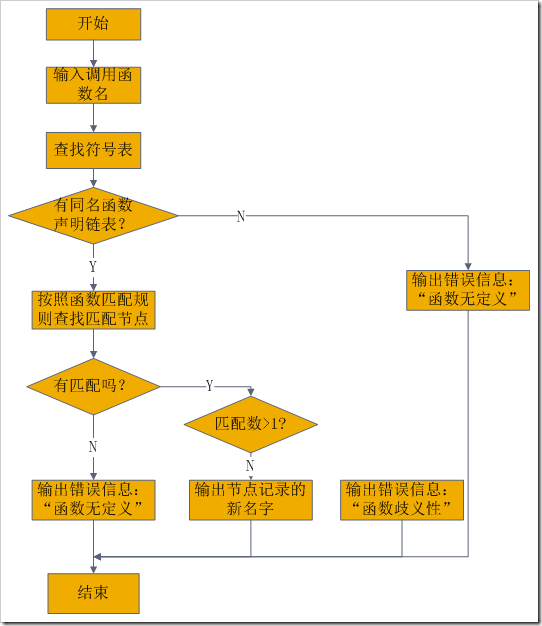详谈面向对象的重载——>“函数重载”与“运算符重载”
C++的函数重载
函数重载的重要性不言而明,但是你知道C++中函数重载是如何实现的呢(虽然本文谈的是C++中函数重载的实现,但我想其它语言也是类似的)?这个可以分解为下面两个问题
1、声明/定义重载函数时,是如何解决命名冲突的?(抛开函数重载不谈,using就是一种解决命名冲突的方法,解决命名冲突还有很多其它的方法,这里就不论述了)
2、当我们调用一个重载的函数时,又是如何去解析的?(即怎么知道调用的是哪个函数呢)
这两个问题是任何支持函数重载的语言都必须要解决的问题!带着这两个问题,我们开始本文的探讨。本文的主要内容如下:
1、例子引入(现象)
什么是函数重载(what)?
为什么需要函数重载(why)?
2、编译器如何解决命名冲突的?
函数重载为什么不考虑返回值类型
3、重载函数的调用匹配
模凌两可的情况
4、编译器是如何解析重载函数调用的?
根据函数名确定候选函数集
确定可用函数
确定最佳匹配函数
5、总结
1、例子引入(现象)
1.1、什么是函数重载(what)?函数重载是指在同一作用域内,可以有一组具有相同函数名,不同参数列表的函数,这组函数被称为重载函数。重载函数通常用来命名一组功能相似的函数,这样做减少了函数名的数量,避免了名字空间的污染,对于程序的可读性有很大的好处。
When two or more different declarations are specified for a single name in the same scope, that name is said to overloaded. By extension, two declarations in the same scope that declare the same name but with different types are called overloaded declarations. Only function declarations can be overloaded; object and type declarations cannot be overloaded. ——摘自《ANSI C++ Standard. P290》
看下面的一个例子,来体会一下:实现一个打印函数,既可以打印int型、也可以打印字符串型。在C++中,我们可以这样做:
#include
using namespace std;
void print(int i)
{
cout<<"print a integer :"< 试想如果没有函数重载机制,如在C中,你必须要这样去做:为这个print函数取不同的名字,如print_int、print_string。这里还只是两个的情况,如果是很多个的话,就需要为实现同一个功能的函数取很多个名字,如加入打印long型、char*、各种类型的数组等等。这样做很不友好!
类的构造函数跟类名相同,也就是说:构造函数都同名。如果没有函数重载机制,要想实例化不同的对象,那是相当的麻烦!
操作符重载,本质上就是函数重载,它大大丰富了已有操作符的含义,方便使用,如+可用于连接字符串等!
通过上面的介绍我们对函数重载,应该唤醒了我们对函数重载的大概记忆。下面我们就来分析,C++是如何实现函数重载机制的。
2、编译器如何解决命名冲突的?
为了了解编译器是如何处理这些重载函数的,我们反编译下上面我们生成的执行文件,看下汇编代码(全文都是在Linux下面做的实验,Windows类似,你也可以参考《一道简单的题目引发的思考》一文,那里既用到Linux下面的反汇编和Windows下面的反汇编,并注明了Linux和Windows汇编语言的区别)。我们执行命令objdump -d a.out >log.txt反汇编并将结果重定向到log.txt文件中,然后分析log.txt文件。发现函数void print(int i) 编译之后为:(注意它的函数签名变为——_Z5printi)

发现函数void print(string str) 编译之后为:(注意它的函数签名变为——_Z5printSs)

我们可以发现编译之后,重载函数的名字变了不再都是print!这样不存在命名冲突的问题了,但又有新的问题了——变名机制是怎样的,即如何将一个重载函数的签名映射到一个新的标识?我的第一反应是:函数名+参数列表,因为函数重载取决于参数的类型、个数,而跟返回类型无关。但看下面的映射关系:
void print(int i) --> _Z5printi
void print(string str) --> _Z5printSs
进一步猜想,前面的Z5表示返回值类型,print函数名,i表示整型int,Ss表示字符串string,即映射为返回类型+函数名+参数列表。最后在main函数中就是通过_Z5printi、_Z5printSs来调用对应的函数的:
80489bc: e8 73 ff ff ff call 8048934 <_Z5printi>
……………
80489f0: e8 7a ff ff ff call 804896f <_Z5printSs>
我们再写几个重载函数来验证一下猜想,如:
void print(long l) --> _Z5printl
void print(char str) --> _Z5printc
可以发现大概是int->i,long->l,char->c,string->Ss….基本上都是用首字母代表,现在我们来现在一个函数的返回值类型是否真的对函数变名有影响,如:
#include
using namespace std;
int max(int a,int b)
{
return a>=b?a:b;
}
double max(double a,double b)
{
return a>=b?a:b;
}
int main()
{
cout<<"max int is: "< 既然返回类型也考虑到映射机制中,这样不同的返回类型映射之后的函数名肯定不一样了,但为什么不将函数返回类型考虑到函数重载中呢?——这是为了保持解析操作符或函数调用时,独立于上下文(不依赖于上下文),看下面的例子
float sqrt(float);
double sqrt(double);
void f(double da, float fla)
{
float fl=sqrt(da);//调用sqrt(double)
double d=sqrt(da);//调用sqrt(double)
fl=sqrt(fla);//调用sqrt(float)
d=sqrt(fla);//调用sqrt(float)
}至此似乎已经完全分析清楚了,但我们还漏了函数重载的重要限定——作用域。上面我们介绍的函数重载都是全局函数,下面我们来看一下一个类中的函数重载,用类的对象调用print函数,并根据实参调用不同的函数:
#include
using namespace std;
class test{
public:
void print(int i)
{
cout<<"int"< void print(int i) --> _ZN4test5printEi
void print(char c) --> _ZN4test5printEc
注意前面的N4test,我们可以很容易猜到应该表示作用域,N4可能为命名空间、test类名等等。这说明最准确的映射机制为:作用域+返回类型+函数名+参数列表
3、重载函数的调用匹配
现在已经解决了重载函数命名冲突的问题,在定义完重载函数之后,用函数名调用的时候是如何去解析的?为了估计哪个重载函数最适合,需要依次按照下列规则来判断:精确匹配:参数匹配而不做转换,或者只是做微不足道的转换,如数组名到指针、函数名到指向函数的指针、T到const T;
提升匹配:即整数提升(如bool 到 int、char到int、short 到int),float到double
使用标准转换匹配:如int 到double、double到int、double到long double、Derived*到Base*、T*到void*、int到unsigned int;
使用用户自定义匹配;
使用省略号匹配:类似printf中省略号参数
如果在最高层有多个匹配函数找到,调用将被拒绝(因为有歧义、模凌两可)。看下面的例子:
void print(int);
void print(const char*);
void print(double);
void print(long);
void print(char);
void h(char c,int i,short s, float f)
{
print(c);//精确匹配,调用print(char)
print(i);//精确匹配,调用print(int)
print(s);//整数提升,调用print(int)
print(f);//float到double的提升,调用print(double)
print('a');//精确匹配,调用print(char)
print(49);//精确匹配,调用print(int)
print(0);//精确匹配,调用print(int)
print("a");//精确匹配,调用print(const char*)
}
定义太少或太多的重载函数,都有可能导致模凌两可,看下面的一个例子:
void f1(char);
void f1(long);
void f2(char*);
void f2(int*);
void k(int i)
{
f1(i);//调用f1(char)? f1(long)?
f2(0);//调用f2(char*)?f2(int*)?
}
这时侯编译器就会报错,将错误抛给用户自己来处理:通过显示类型转换来调用等等(如f2(static_cast(0),当然这样做很丑,而且你想调用别的方法时有用做转换)。上面的例子只是一个参数的情况,下面我们再来看一个两个参数的情况:
int pow(int ,int);
double pow(double,double);
void g()
{
double d=pow(2.0,2)//调用pow(int(2.0),2)? pow(2.0,double(2))?
}
4、编译器是如何解析重载函数调用的?
编译器实现调用重载函数解析机制的时候,肯定是首先找出同名的一些候选函数,然后从候选函数中找出最符合的,如果找不到就报错。下面介绍一种重载函数解析的方法:编译器在对重载函数调用进行处理时,由语法分析、C++文法、符号表、抽象语法树交互处理,交互图大致如下:由匹配文法中的函数调用,获取函数名;
获得函数各参数表达式类型;
语法分析器查找重载函数,符号表内部经过重载解析返回最佳的函数
语法分析器创建抽象语法树,将符号表中存储的最佳函数绑定到抽象语法树上
下面我们重点解释一下重载解析,重载解析要满足前面《3、重载函数的调用匹配》中介绍的匹配顺序和规则。重载函数解析大致可以分为三步:
根据函数名确定候选函数集
从候选函数集中选择可用函数集合
从可用函数集中确定最佳函数,或由于模凌两可返回错误
4.1、根据函数名确定候选函数集
根据函数在同一作用域内所有同名的函数,并且要求是可见的(像private、protected、public、friend之类)。“同一作用域”也是在函数重载的定义中的一个限定,如果不在一个作用域,不能算是函数重载,如下面的代码:
void f(int);
void g()
{
void f(double);
f(1); //这里调用的是f(double),而不是f(int)
}为了查找候选函数集,一般采用深度优选搜索算法:
step1:从函数调用点开始查找,逐层作用域向外查找可见的候选函数
step2:如果上一步收集的不在用户自定义命名空间中,则用到了using机制引入的命名空间中的候选函数,否则结束
在收集候选函数时,如果调用函数的实参类型为非结构体类型,候选函数仅包含调用点可见的函数;如果调用函数的实参类型包括类类型对象、类类型指针、类类型引用或指向类成员的指针,候选函数为下面集合的并:
(1)在调用点上可见的函数;
(2)在定义该类类型的名字空间或定义该类的基类的名字空间中声明的函数;
(3)该类或其基类的友元函数;
下面我们来看一个例子更直观:
void f();
void f(int);
void f(double, double = 314);
names pace N
{
void f(char3 ,char3);
}
classA{
public: operat or double() { }
};
int main ( )
{
using names pace N; //using指示符
A a;
f(a);
return 0;
}
(1)从函数调用所在的main函数作用域内开始查找函数f的声明, 结果未找到。到main函数
作用域的外层作用域查找,此时在全局作用域找到3个函数f的声明,将它们放入候选集合;
(2)到using指示符所指向的命名空间 N中收集f ( char3 , char3 ) ;
(3)考虑2类集合。其一为定义该类类型的名字空间或定义该类的基类的名字空间中声明的函
数;其二为该类或其基类的友元函数。本例中这2类集合为空。
最终候选集合为上述所列的 4个函数f。
4.2、确定可用函数
可用的函数是指:函数参数个数匹配并且每一个参数都有隐式转换序列。
(1)如果实参有m个参数,所有候选参数中,有且只有 m个参数;
(2)所有候选参数中,参数个数不足m个,当前仅当参数列表中有省略号;
(3)所有候选参数中,参数个数超过 m个,当前仅当第m + 1个参数以后都有缺省值。如果可用
集合为空,函数调用会失败。
这些规则在前面的《3、重载函数的调用匹配》中就有所体现了。
4.3、确定最佳匹配函数
确定可用函数之后,对可用函数集中的每一个函数,如果调用函数的实参要调用它计算优先级,最后选出优先级最高的。如对《3、重载函数的调用匹配》中介绍的匹配规则中按顺序分配权重,然后计算总的优先级,最后选出最优的函数。
5、总结
本文介绍了什么是函数重载、为什么需要函数重载、编译器如何解决函数重名问题、编译器如何解析重载函数的调用。通过本文,我想大家对C++中的重载应该算是比较清楚了。说明:在介绍函数名映射机制是基于g++编译器,不同的编译器映射有些差别;编译器解析重载函数的调用,也只是所有编译器中的一种。如果你对某个编译器感兴趣,请自己深入去研究。最后我抛给大家两个问题:
1、在C++中加号+,即可用于两个int型之间的相加、也可以用于浮点数数之间的相加、字符串之间的连接,那+算不算是操作符重载呢?换个场景C语言中加号+,即可用于两个int型之间的相加、也可以用于浮点数数之间的相加,那算不算操作符重载呢?
2、模板(template)的重载时怎么样的?模板函数和普通函数构成的重载,调用时又是如何匹配的呢?
附录:一种C++函数重载机制
这个机制是由张素琴等人提出并实现的,他们写了一个C++的编译系统COC++(开发在国产机上,UNIX操作系统环境下具有中国自己版权的C、C++和FORTRAN语言编译系统,这些编译系统分别满足了ISOC90、AT&T的C++85和ISOFORTRAN90标准)。COC++中的函数重载处理过程主要包括两个子过程:
1、在函数声明时的处理过程中,编译系统建立函数声明原型链表,按照换名规则进行换名并在函数声明原型链表中记录函数换名后的名字(换名规则跟本文上面描述的差不多,只是那个int-》为哪个字符、char-》为哪个字符等等类似的差异)
2、在函数调用语句翻译过程中,访问符号表,查找相应函数声明原型链表,按照类型匹配原则,查找最优匹配函数节点,并输出换名后的名字下面给出两个子过程的算法建立函数声明原型链表算法流程如图附1,函数调用语句翻译算法流程如图附2。
下面是C++创始人Bjarne Stroustrup的回答:
1)Find the set of function template specializations that will take part in overload resolution.
2)if two template functions can be called and one is more specified than the other, consider only the most specialized template function in the following steps.
3)Do overload resolution for this set of functions, plus any ordinary functions as for ordinary functions.
4)If a function and a specialization are equally good matches, the function is perferred.
5)If no match is found, the call is an error.
C++ 运算符重载
1.运算符重载定义:
C++中预定义的运算符的操作对象只能是基本数据类型。但实际上,对于许多用户自定义类型(例如类),也需要类似的运算操作。这时就必须在C++中重新定义这些运算符,赋予已有运算符新的功能,使它能够用于特定类型执行特定的操作。运算符重载的实质是函数重载,它提供了C++的可扩展性,也是C++最吸引人的特性之一。运算符重载是通过创建运算符函数实现的,运算符函数定义了重载的运算符将要进行的操作。运算符函数的定义与其他函数的定义类似,惟一的区别是运算符函数的函数名是由关键字operator和其后要重载的运算符符号构成的。运算符函数定义的一般格式如下:
<返回类型说明符> operator <运算符符号>(<参数表>)
{
<函数体>
}
2.运算符重载时要遵循以下规则:
(1) 除了类属关系运算符"."、成员指针运算符".*"、作用域运算符"::"、sizeof运算符和三目运算符"?:"以外,C++中的所有运算符都可以重载。(2) 重载运算符限制在C++语言中已有的运算符范围内的允许重载的运算符之中,不能创建新的运算符。
(3) 运算符重载实质上是函数重载,因此编译程序对运算符重载的选择,遵循函数重载的选择原则。
(4) 重载之后的运算符不能改变运算符的优先级和结合性,也不能改变运算符操作数的个数及语法结构。
(5) 运算符重载不能改变该运算符用于内部类型对象的含义。它只能和用户自定义类型的对象一起使用,或者用于用户自定义类型的对象和内部类型的对象混合使用时。
(6) 运算符重载是针对新类型数据的实际需要对原有运算符进行的适当的改造,重载的功能应当与原有功能相类似,避免没有目的地使用重载运算符。
(7)重载运算符的函数不能有默认的参数,否则就改变了运算符的参数个数,与前面第3点相矛盾了;
(8)重载的运算符只能是用户自定义类型,否则就不是重载而是改变了现有的C++标准数据类型的运算符的规则了,会引会天下大乱的;
(9)用户自定义类的运算符一般都必须重载后方可使用,但两个例外,运算符“=”和“&”不必用户重载;
(10)运算符重载可以通过成员函数的形式,也可是通过友元函数,非成员非友元的普通函数。
3.运算符重载的形式:
运算符函数重载一般有两种形式:重载为类的成员函数和重载为类的非成员函数。非成员函数通常是友元。(可以把一个运算符作为一个非成员、非友元函数重载。但是,这样的运算符函数访问类的私有和保护成员时,必须使用类的公有接口中提供的设置数据和读取数据的函数,调用这些函数时会降低性能。可以内联这些函数以提高性能。)1) 成员函数运算符
运算符重载为类的成员函数的一般格式为:
<函数类型> operator <运算符>(<参数表>)
{
<函数体>
}
当运算符重载为类的成员函数时,函数的参数个数比原来的操作数要少一个(后置单目运算符除外),这是因为成员函数用this指针隐式地访问了类的一个对象,它充当了运算符函数最左边的操作数。因此:
(1) 双目运算符重载为类的成员函数时,函数只显式说明一个参数,该形参是运算符的右操作数。
(2) 前置单目运算符重载为类的成员函数时,不需要显式说明参数,即函数没有形参。
(3) 后置单目运算符重载为类的成员函数时,函数要带有一个整型形参。
调用成员函数运算符的格式如下:
<对象名>.operator <运算符>(<参数>)
它等价于
<对象名><运算符><参数>
例如:a+b等价于a.operator +(b)。一般情况下,我们采用运算符的习惯表达方式。
2) 友元函数运算符
运算符重载为类的友元函数的一般格式为:
friend <函数类型> operator <运算符>(<参数表>)
{
<函数体>
}
当运算符重载为类的友元函数时,由于没有隐含的this指针,因此操作数的个数没有变化,所有的操作数都必须通过函数的形参进行传递,函数的参数与操作数自左至右一一对应。
调用友元函数运算符的格式如下:
operator <运算符>(<参数1>,<参数2>)
它等价于
<参数1><运算符><参数2>
例如:a+b等价于operator +(a,b)。
4.两种重载形式的比较
在多数情况下,将运算符重载为类的成员函数和类的友元函数都是可以的。但成员函数运算符与友元函数运算符也具有各自的一些特点:(1) 一般情况下,单目运算符最好重载为类的成员函数;双目运算符则最好重载为类的友元函数。
(2) 以下一些双目运算符不能重载为类的友元函数:=、()、[]、->。
(3) 类型转换函数只能定义为一个类的成员函数而不能定义为类的友元函数。
(4) 若一个运算符的操作需要修改对象的状态,选择重载为成员函数较好。
(5) 若运算符所需的操作数(尤其是第一个操作数)希望有隐式类型转换,则只能选用友元函数。
(6) 当运算符函数是一个成员函数时,最左边的操作数(或者只有最左边的操作数)必须是运算符类的一个类对象(或者是对该类对象的引用)。如果左边的操作数必须是一个不同类的对象,或者是一个内部类型的对象,该运算符函数必须作为一个友元函数来实现。
(7) 当需要重载运算符具有可交换性时,选择重载为友元函数。
5.实例:
1)用成员函数来重载运算符:
#include
using namespace std;
class X{
int i;
public:
X(int ii=0){i=ii;}
X operator +(const X &rx){
i+=rx.i;
return X(i);
}
int GetI(){return i;}
};
int main(){
X a(1),b(3);
cout<<(a+b).GetI()< 说明:此时若用
#include
using namespace std;
则会出现如下的错误:
fatal error C1001: INTERNAL COMPILER ERROR
所以头文件用:#include
#include
using namespace std;
class Complex{
public:
Complex(double r=0.0,double i=0.0){
real=r;
image=i;
}
friend Complex operator+(const Complex&,const Complex&);
void display();
private:
double real;
double image;
};
Complex operator+(const Complex &c1,const Complex &c2){
return Complex(c1.real+c2.real,c1.image+c2.image);
}
void Complex::display(){
cout<<"("<参考C++ 之运算符重载系列连载文章:
1.运算符重载是对已有的运算符赋予多重含义,使同一个运算符作用域不同类型的数据导致不同行为的发生。比如
int i;
int i1=10,i2=10;
i=i1+i2;
std::cout<<"i1+i2="<在这个程序里"+"既完成两个整形数的加法运算,又完成了双精度型的加法运算。为什么同一个运算符"+"可以用于完成不同类型的数据的加法运算?这是因为C++针对预定义基本数据类型已经对"+"运算符做了适当的重载。在编译程序编译不同类型数据的加法表达式时,会自动调用相应类型的加法运算符重载函数。但是C++中所提供的预定义的基本数据类型毕竟是有限的,在解决一些实际的问题时,往往需要用户自定义数据类型。比如高中数学里所提到的复数:
class Complex //复数类
{
public:
double real;//实数
double imag;//虚数
Complex(double real=0,double imag=0)
{
this->real=real;
this->imag=imag;
}
}sum=com1+com2;
#include "stdafx.h"
#include
class Complex //复数类
{
public:
double real;//实数
double imag;//虚数
Complex(double real=0,double imag=0)
{
this->real=real;
this->imag=imag;
}
};
Complex operator+(Complex com1,Complex com2)//运算符重载函数
{
return Complex(com1.real+com2.real,com1.imag+com2.imag);
}
int main()
{
Complex com1(10,10),com2(20,20),sum;
sum=com1+com2;//或sum=operator+(com1,com2)
std::cout<<"sum的实数部分为"< 结果:
在上述示例代码中,调用运算符重载函数时,也可以以operator+(com1,com2)的形式来调用,实际上com1+com2在程序解释时也是转化成前者一样的形式。但是直接用com1+com2的形式更加符合人的书写习惯。2.上述示例中的运算符重载函数是不属于任何的类,是全局的函数。因为在Complex类(复数类)中的数据成员是公有的性质,所以运算符重载函数可以访问。但如果定义为私有的呢,那该怎么办。其实,在实际的运算符重载函数声明当中,要不定义其为要操作类的成员函数或类的友元函数。
(1)运算符重载函数作为类的友元函数的形式:
class 类名
{
friend 返回类型 operator运算符(形参表);
}
类外定义格式:
返回类型 operator运算符(参数表)
{
函数体
}
友元函数重载双目运算符(有两个操作数,通常在运算符的左右两则),参数表中的个数为两个。若是重载单目运算符(只有一个操作数),则参数表中只有一参数。
i.友元函数重载双目运算符(+):
#include "stdafx.h"
#include
class Complex //复数类
{
private://私有
double real;//实数
double imag;//虚数
public:
Complex(double real=0,double imag=0)
{
this->real=real;
this->imag=imag;
}
friend Complex operator+(Complex com1,Complex com2);//友元函数重载双目运算符+
void showSum();
};
Complex operator+(Complex com1,Complex com2)//友元运算符重载函数
{
return Complex(com1.real+com2.real,com1.imag+com2.imag);
}
void Complex::showSum()
{
std::cout<0)
std::cout<<"+";
if(imag!=0)
std::cout< 结果:
ii.友元函数重载单目运算符(++):#include "stdafx.h"
#include
class Point//坐标类
{
private:
int x;
int y;
public:
Point(int x,int y)
{
this->x=x;
this->y=y;
}
friend voidoperator++(Point& point);//友元函数重载单目运算符++
void showPoint();
};
voidoperator++(Point& point)//友元运算符重载函数
{
++point.x;
++point.y;
}
void Point::showPoint()
{
std::cout<<"("< 结果:
![]()
运算符重载函数可以返回任何类型,甚至是void,但通常返回类型都与它所操作的类类型一样,这样可以使运算符使用在复杂的表达式中。比如把上述双目运算符重载函数示例代码中main()主函数里的com1+com2改为com1+com2+com2,那么结果又会不一样了。像赋值运算符=、下标运算符[]、函数调用运算符()等是不能被定义为友元运算符重载函数。同一个运算符可以定义多个运算符重载函数来进行不同的操作。
(2)运算符重载函数作为类的成员函数的形式:
class 类名
{
返回类型 operator 运算符(形参表);
}
类外定义格式:
返回类型 类名:: operator 运算符(形参表)
{
函数体;
}
对于成员函数重载运算符而言,双目运算符的参数表中仅有一个参数,而单目则无参数。同样的是重载,为什么和友元函数在参数的个数上会有所区别的。原因在于友元函数,没有this指针。
i.成员函数重载双目运算符(+):
#include "stdafx.h"
#include
class Complex //复数类
{
private://私有
double real;//实数
double imag;//虚数
public:
Complex(double real=0,double imag=0)
{
this->real=real;
this->imag=imag;
}
Complex operator+(Complex com1);//成员函数重载双目运算符+
void showSum();
};
Complex Complex::operator+(Complex com1)
{
return Complex(real+com1.real,imag+com1.imag);
}
void Complex::showSum()
{
std::cout<0)
std::cout<<"+";
if(imag!=0)
std::cout< 对于双目运算符而言,运算符重载函数的形参中仅为一个参数,它作为运算符的右操作数(如com2对象),而当前对象作为左操作数(如:上述中的com1对象),它是通过this指针隐含传递给成员运算符重载函数的。
ii.成员函数重载单目运算符(++):
#include "stdafx.h"
#include
class Point//坐标类
{
private:
int x;
int y;
public:
Point(int x,int y)
{
this->x=x;
this->y=y;
}
voidoperator++();//成员函数重载双目运算符++
void showPoint();
};
void Point::operator++()
{
++x;
++y;
}
void Point::showPoint()
{
std::cout<<"("< 对于单目运算符而言,当前对象作为运算符的操作数。
在运算符重载运用时应该注意以下几个问题:(1)C++中只能对已有的C++运算符进行重载,不允许用户自己定义新的运算符;(2)C++中绝大部分的运算符可重载,除了成员访问运算符.,成员指针访问运算符.*,作用域运算符::,长度运算符sizeof以及条件运算符?:;(3)重载后不能改变运算符的操作对象(操作数)的个数。如:"+"是实现两个操作数的运算符,重载后仍然为双目运算符;(4)重载不能改变运算符原有的优先级;(5)重载不能改变运算符原有结合的特性。比如:z=x/y*a,执行时是先做左结合的运算x/y,重载后也是如此,不会变成先做右结合y*a;(6)运算符重载不能全部是C++中预定义的基本数据,这样做的目的是为了防止用户修改用于基本类型数据的运算符性质;(7)从上述的示例中可以看到双目运算符可以被重载为友元函数也可以重载为成员函数,但有一种情况,只能使用友元函数,是什么情况呢?我举个例子:
class Complex //复数类
{
private://私有
double real;//实数
double imag;//虚数
public:
Complex(double real=0,double imag=0)
{
this->real=real;
this->imag=imag;
}
Complex operator+(int x);
};
Complex Complex::operator+(int x)
{
return Complex(real+x,imag);
}
int main()
{
Complex com1(5,10),total;
total=com1+5;
return0;
}如果我们把上述main()主函数实现部分里的total=com1+5改为total=5+com1;那么程序就会报错(没有与这些操作数匹配的 "+" 运算符),因为左操作数5不是该复数类的对象,不能调用相应的成员函数Complex operator+(int x),所以编译错误。但如果我们定义一下两个友元函数就能解决上述的问题:
friend Complex operator+(Complex com1,int x);
friend Complex operator+(int x,Complex com1);
3.最后还是一样,我将用一个示例来总结一下今天所讲的内容(开发工具:vs2010):
#include "stdafx.h"
#include
class Complex //复数类
{
private://私有
double real;//实数
double imag;//虚数
public:
Complex(double real=0,double imag=0)
{
this->real=real;
this->imag=imag;
}
Complex operator+(Complex com1);//成员函数重载双目运算符+
//或friend Complex operator+(Complex com1,Complex com2);//友元函数重载双目运算符+
friend Complex operator+(Complex com1,int x);//友元函数重载双目运算符+
//或Complex operator+(int x);
friend Complex operator+(int x,Complex com1);//友元函数重载双目运算符+
void showSum();
};
Complex Complex::operator+(Complex com1)
{
return Complex(real+com1.real,imag+com1.imag);
}
Complex operator+(Complex com1,int x)//左操作数类型为复数,右操作数的类型为整数
{
return Complex(com1.real+x,com1.imag);
}
Complex operator+(int x,Complex com1)//左操作数类型为整数,右操作数的类型为复数
{
return Complex(x+com1.real,com1.imag);
}
void Complex::showSum()
{
std::cout<0)
std::cout<<"+";
if(imag!=0)
std::cout<x=x;
this->y=y;
}
friend voidoperator++(Point& point);//友元函数重载单目运算符++
Point operator++();//成员函数重载双目运算符++
void showPoint();
};
voidoperator++(Point& point)//友元运算符重载函数
{
++point.x;
++point.y;
}
Point Point::operator++()
{
++x;
++y;
return*this;//返回当前对象
}
void Point::showPoint()
{
std::cout<<"("< 结果:




